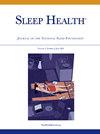Sleep on it:一项探索性行为对同居伴侣睡眠结果影响的初步研究。
IF 3.4
2区 医学
Q2 CLINICAL NEUROLOGY
引用次数: 0
摘要
目的:本初步研究的主要目的是检查性活动对客观和主观睡眠参数的影响。方法:采用重复测量平衡,交叉设计三种条件-无性行为,单独手淫和有伴侣的性行为。在这项初步研究中,14名个体参与了研究(7名女性,7名男性;平均年龄29.9±3.4岁)。使用便携式多导睡眠描记仪(DREEM3)连续11晚监测性活动和睡眠,并进行每日性和睡眠调查。统计分析:采用线性混合模型来检验在三种情况下(即无性行为、单独手淫和有伴侣性行为)的睡眠、准备和动机的差异。还计算了具有95%置信限的条件间两两比较的Cohen效应大小,其效应大小解释如下:小= 0.2,中= 0.5,大= 0.8,非常大= 1.0。进行了Wilcoxon sign - rank测试来比较不同条件下伴侣之间的睡眠阶段一致性。结果:与无性行为条件相比,在单独手淫和有伴侣的性行为条件下,参与者试图入睡的时间要晚得多(p = 0.004)。与无性行为相比,单独手淫和有伴侣的性行为明显改善了入睡后醒来和睡眠效率(p < 0.05)。主观睡眠在不同条件下无差异(p < 0.05)。无论参与者是否有性行为,当他们一起睡觉时,快速眼动睡眠的睡眠阶段一致性更长(p < 0.05)。结论:从事性活动,无论是单独手淫还是与伴侣手淫,都可以通过减少睡眠后的清醒程度和提高睡眠效率来显著提高客观睡眠质量。客观起床时间、睡眠持续时间、睡眠潜伏期和主观睡眠测量在性活动后没有显示差异,这可能是由于样本量小且只纳入了健康睡眠者。未来的研究应该集中在扩大样本量和纳入有睡眠障碍的参与者,以彻底调查睡前性行为是否能改善睡眠。本文章由计算机程序翻译,如有差异,请以英文原文为准。
Sleep on it: A pilot study exploring the impact of sexual activity on sleep outcomes in cohabiting couples
Objective
The main aim of this pilot study was to examine the impact of sexual activity on objective and subjective sleep parameters.
Methods
A repeated-measures counterbalanced, cross-over design with three conditions - no sex, solo masturbation, and partnered sex was employed with cohabiting couples. In this pilot study 14 individuals participated in the study (7 females, 7 males; mean age 29.9 ± 3.4 years). Sexual activities and sleep were monitored for 11 consecutive nights using a portable polysomnography system (DREEM3) and daily sex and sleep surveys.
Statistical analyses
Linear mixed models were employed to examine differences in sleep, readiness, and motivation following three conditions (i.e., no sex, solo masturbation, and partnered sex). Cohen’s d effect sizes with 95% confidence limits were also calculated for pairwise comparisons between conditions with the effect of magnitude interpreted as follows: small = 0.2, medium 0.5, large 0.8, very large 1.0. Wilcoxon Signed-Rank tests were conducted to compare the sleep stage concordance between partners across conditions.
Results
Participants attempted sleep considerably later following the solo masturbation and partnered sex conditions compared to the no sex condition (p = .004). Wake after sleep onset and sleep efficiency improved considerably following solo masturbation and partnered sex compared to no sex (p < .05). No differences were observed across conditions for subjective sleep (p > .05). Sleep stage concordance for rapid eye movement sleep was longer when participants slept together regardless of whether they engaged or did not engage in sexual activity (p < .05).
Conclusions
Engaging in sexual activity, whether solo masturbation or partnered, significantly enhanced objective sleep quality by reducing wakefulness after sleep onset and improving sleep efficiency. Objective wake up time, sleep duration, sleep latency and subjective sleep measures showed no differences postsexual activity, potentially attributable to the small sample size and the inclusion of only healthy sleepers. Future research should focus on expanding the sample size and incorporating participants with sleep disorders to thoroughly investigate if sexual activity before bedtime can improve sleep.
求助全文
通过发布文献求助,成功后即可免费获取论文全文。
去求助
来源期刊

Sleep Health
CLINICAL NEUROLOGY-
CiteScore
6.30
自引率
9.80%
发文量
114
审稿时长
54 days
期刊介绍:
Sleep Health Journal of the National Sleep Foundation is a multidisciplinary journal that explores sleep''s role in population health and elucidates the social science perspective on sleep and health. Aligned with the National Sleep Foundation''s global authoritative, evidence-based voice for sleep health, the journal serves as the foremost publication for manuscripts that advance the sleep health of all members of society.The scope of the journal extends across diverse sleep-related fields, including anthropology, education, health services research, human development, international health, law, mental health, nursing, nutrition, psychology, public health, public policy, fatigue management, transportation, social work, and sociology. The journal welcomes original research articles, review articles, brief reports, special articles, letters to the editor, editorials, and commentaries.
 求助内容:
求助内容: 应助结果提醒方式:
应助结果提醒方式:


